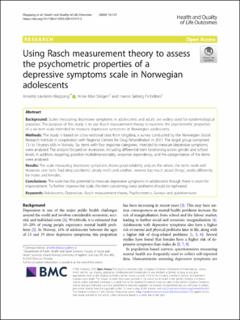Using Rasch measurement theory to assess the psychometric properties of a depressive symptoms scale in Norwegian adolescents
Peer reviewed, Journal article
Published version

View/
Date
2020Metadata
Show full item recordCollections
Original version
10.1186/s12955-020-01373-5Abstract
Background Scales measuring depressive symptoms in adolescents and adults are widely used for epidemiological purposes. The purpose of this study is to use Rasch measurement theory to examine the psychometric properties of a six-item scale intended to measure depressive symptoms in Norwegian adolescents. Methods The study is based on cross-sectional data from Ungdata, a survey conducted by the Norwegian Social Research Institute in cooperation with Regional Centres for Drug Rehabilitation in 2017. The target group comprised 13- to 19-years olds in Norway. Six items with four response categories, intended to measure depressive symptoms, were analysed. The analysis focused on invariance, including differential item functioning across gender and school levels. In addition, targeting, possible multidimensionality, response dependency, and the categorisation of the items were analysed. Results The scale measuring depressive symptoms shows good reliability and, on the whole, the items work well. However, one item, ‘had sleep problems’, clearly misfit and another, ‘worried too much about things’, works differently for males and females. Conclusions The scale has the potential to measure depressive symptoms in adolescents though there is room for improvement. To further improve the scale, the item concerning sleep problems should be rephrased.